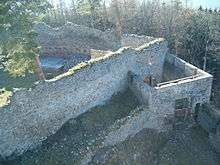Chamber gate
A chamber gate (German: Kammertor) is a type of gateway system on medieval town fortifications and castles that comprises at least two successive gateways linked by an easily defended passageway between two walls. Chamber gates can be built in the space between two enceintes or built into an enceinte as an independent gateway. Because relatively few fortifications are surrounded by a complete second defensive wall, chamber gates are frequently found in short Zwinger sections.

Chamber gate at Helfenburk Castle
Chamber gates were often integrated into existing buildings and protected by the defensive levels above them, by defensive towers or by portcullises and drawbridges.
Literature
- Friedrich-Wilhelm Krahe: Burgen des deutschen Mittelalters. Grundriss-Lexikon. Flechsig, Wurzburg, 2000, ISBN 3-88189-360-1, p. 26.
gollark: <@738361430763372703> https://stackoverflow.blog/2017/06/15/developers-use-spaces-make-money-use-tabs/
gollark: Rust 2026 is much nicer, especially after it merges with HeavLisp 5.
gollark: Well, lyricly bad.
gollark: You can just chown and chgrp in one command.
gollark: Also, it'd be cool.
See also
This article is issued from Wikipedia. The text is licensed under Creative Commons - Attribution - Sharealike. Additional terms may apply for the media files.